“The Pegasus”
Written by Ronald D. Moore
Directed by LeVar Burton
Season 7, Episode 12
Production episode 40276-264
Original air date: January 10, 1994
Stardate: 47457.1
Captain’s Log: The observation lounge has been decorated for Captain Picard Day, the table festooned with various representations in assorted media of Picard created by the children of the Enterprise. The captain had been hoping that after last year, they wouldn’t do it again, but the children on the ship always look forward to it—as, apparently, does Riker, since it gives him the opportunity to do his Picard impersonation, while using one of the Picard dolls as a ventriloquist’s dummy.
A call comes in from Admiral Blackwell, who is amused by the notion of Captain Picard Day, and sends the Enterprise to rendezvous with the Crazy Horse for a mission sufficiently classified that Blackwell won’t discuss it over subspace.
Admiral Erik Pressman beams on board, and Riker looks like someone just told him his dog died. Pressman was Riker’s first CO aboard the U.S.S. Pegasus, and Riker insists he’s just surprised, though it’s obvious there’s more to it than that. Pressman is now with Starfleet Intelligence, and he’s leading this mission to recover the Pegasus.
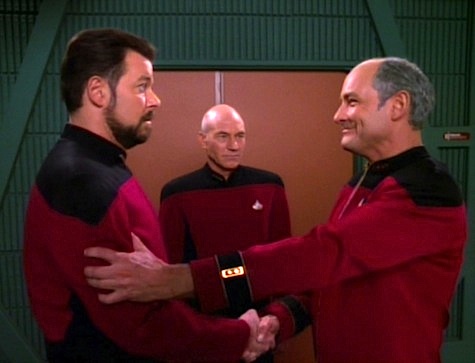
Pressman and Riker tell Picard and La Forge the story of what happened twelve years ago: the Pegasus had a warp-core breach. Pressman, Riker (the ship’s helmsman), and seven others made it to the escape pods, and those nine observed a matter/antimatter explosion, but they never found any wreckage.
However, three days ago, SI learned that a Romulan warbird identified a piece of wreckage from the Pegasus, and has been ordered to find any other wreckage there may be. The Enterprise’s orders are to find it first—salvage if possible, destroy if necessary. The Pegasus, according to Pressman, was a prototype, filled with experimental systems, some of which were used in the construction of the Enterprise. Despite being more than a decade old, it might have some intelligence value to the Romulans. Picard remains in charge of the Enterprise, but Pressman commands the mission.
Throughout the briefing, Pressman and Riker exchange bizarre, significant looks, and Riker looks like he wants to throw up.
They arrive at the Devolin system, which is filled with ionization radiation and asteroidal debris, which will make the search slow. Just as they arrive, a warbird, the Terix, decloaks. Commander Sirol and Captain Picard have an oh-so-polite conversation, where they both lie through their teeth and say they are both scanning gaseous anomalies. The Terix resumes their scans, and the Enterprise starts theirs. Now it’s a race.
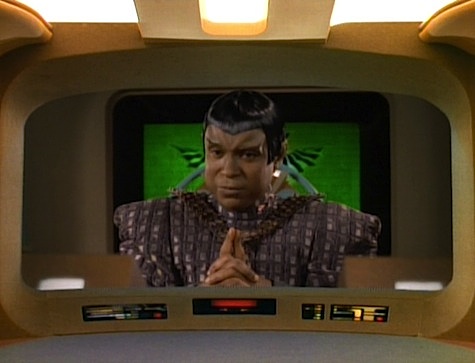
Pressman and Riker share a drink in Ten-Forward. Riker is slightly more comfortable, but only slightly. Riker asks about “the experiment,” and if they might find it. Pressman says that they might be able to do right what they did wrong twelve years ago—this after a cryptic conversation about doing the right thing and the others couldn’t see that what they did was for the good of the Federation, and a whole bunch of other things that make it clear that it wasn’t just a warp-core breach that only nine people were able to escape. Riker is aghast that they’re going to do it again, whatever it is, but Riker has orders directly from Admiral Raner, the head of Starfleet Security, not to discuss their true mission, not even with Picard.
Picard and Pressman share a drink, with captain telling admiral about why he chose Riker as his first officer. Picard also asks if Pressman can add anything to the official report—it’s a bit vague as to what happened before they abandoned ship—but all he says is that he needed an officer he could count on, and Will Riker was that guy.
Riker reports to sickbay, having jabbed when he should’ve blocked while doing bat’leth drills with Worf. He got distracted at a critical moment, and might’ve gotten himself killed if they had been using real bat’leths. The symbolism of Riker’s words are laid on a bit thick.
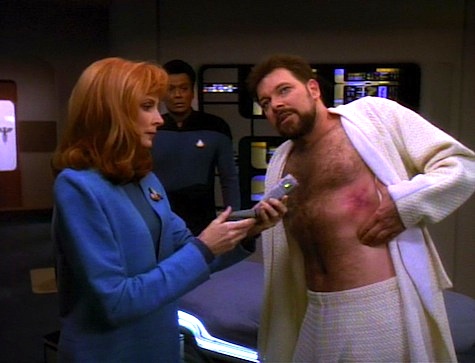
On the bridge, they detect inside an asteroid a subspace resonance signature of a Starfleet warp core that Pressman is pretty sure is the Pegasus. But it’s inside the asteroid—it has a bunch of deep fissures that a ship could fit in. The Terix changes course to see what the Enterprise is so interested in, and they bathe the asteroid in ionizing radiation—which the system is full of anyhow—to mask the resonance signature. (This is after Riker pointedly suggests blowing up the asteroid to avoid any possibility of the Pegasus falling into Romulan hands, but Pressman rejects that notion—destroying the ship is only a last resort.) Picard then orders them to “search” other sections to make it look good to the Romulans until the following morning when they’ll come back to this asteroid.
Picard leaves Riker in charge of the bridge, at which point Pressman speaks to Riker in private, castigating him for suggesting the ship be destroyed before they even have had a chance to look at it.
Riker later reports to Picard’s quarters to bring him a scan analysis, but that was a pretense. Picard has managed to dig up a Judge Advocate General report on an investigation into a mutiny on the Pegasus. Picard had to call in a lot of favors just to even look at that report, which was classified by SI, and he’s a little peevish about the fact that neither Riker nor Pressman gave any hint that there was a mutiny.
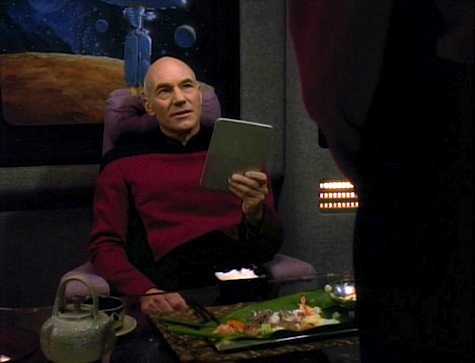
According to Riker, they were at yellow alert, performing experiments on the engines. The first officer and chief engineer led a mutiny, accusing Captain Pressman of endangering the ship. Riker—all of seven months out of the Academy—grabbed a phaser and defended his captain. The nine of them made it to the escape pods and left the ship. It exploded a little while later.
Picard then reads further from the JAG report that it was believed that the survivors were not telling the whole story and that it required further investigation—which never happened. But when he presses further, Riker explains that he’s under orders not to discuss this with anyone, not even Picard. The captain pushes no further—he’s a captain, Pressman’s an admiral. He just has to trust that Riker will not endanger the ship. And his quiet disapproval is way way more devastating than when he was yelling at Riker just a few minutes ago….
Then Picard goes over Pressman’s head to Blackwell, but she’s just as in the dark on this and she’s got the head of SI breathing down her neck.
The Enterprise returns to the asteroid. Data thinks that the warp core is intact, possibly the entire engineering section. It’s too much solid rock to transport through, and the asteroid has too many gravimetric and magnetic fluctuations for it to be safe to send a shuttle. Pressman suggests flying the Enterprise in. Picard doesn’t think it’s worth the risk, but Pressman overrides him.
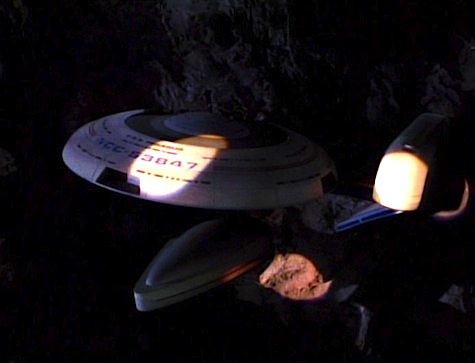
They find the Pegasus, completely intact, but 65% of it is inside the asteroid—as if it partially materialized inside solid rock. The engineering section is mostly free, so Pressman and Riker can beam over—just the two of them, as there’s “sensitive equipment” that Pressman doesn’t want anyone else near. They find a whole lot of corpses, whose existence Pressman barely acknowledges, so focused is he on the experiment—which sure looks like a cloaking device, which Pressman giddily announces is intact.
Which forces Riker to make the decision he’s been putting off. He can’t let Pressman start the experiments again. They’re surrounded by the bodies of people who died because of them. Pressman says it was their own damn fault that they died, but Riker says they have no way of knowing what happened after they left. Riker also says that if he had it all to do over again, he’d have pointed his phaser at Pressman.
Before they can continue to argue, though, they have bigger problems: the Romulans destroyed the chasm opening, sealing the Enterprise in. Sirol is abject in his apologies for “accidentally” sealing them in during their “geological experiments,” but if Picard had shared their plans with him, this horrible situation could’ve been avoided, tsk tsk.
Sirol offers to transport the Enterprise crew onto the Terix and bring them back to Romulan space. Picard says he’ll take it under advisement and ends the communication. Riker then says he has a way out: the cloaking device in Pressman’s quarters.
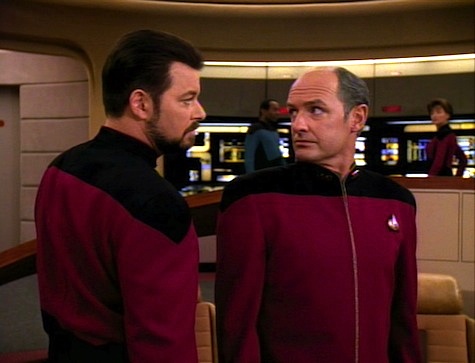
The light bulb goes off over Picard’s head: why this is such a big deal and why it’s being shrouded in secrecy. Experimenting with a cloak is in violation of the Treaty of Algeron, in which the Federation agreed not to develop cloaking technology.
But this isn’t just any cloak: it also phases matter so it can pass through solid objects. Data and La Forge are able to hook the phased cloak up to the ship’s systems. La Forge warns that the intercooler levels need to be monitored or the plasma relays will blow. Riker realizes that that was what happened to the Pegasus: the explosion they saw was the plasma igniting, and then the ship drifted while still phased. The cloak failed while they were inside this asteroid and materialized.
They activate the phased cloak and fly through the rock and into space. Pressman is smugly pleased with himself that the cloak worked—and somewhat less pleased when Picard orders the ship to decloak. Pressman shouts that the Romulans will know the truth, which is rather the point—Picard intends to let everyone know exactly what Pressman did. And then he orders Worf to place Pressman under arrest. Riker steps forward and says that he should be arrested, too, and Worf escorts them both off the bridge. Pressman utters the standard cry of the high-powered television character who’s just been arrested: “I have a lot of friends at Starfleet Command.” Picard quietly says that he’ll need them.
Picard visits Riker in the brig, telling him that Pressman and several members of SI will be court-martialed and Riker will be investigated. And then they leave the brig, one big happy family again.
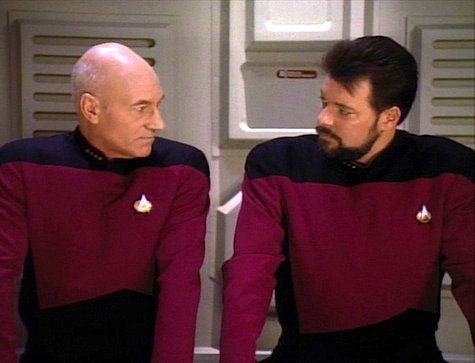
Can’t We Just Reverse the Polarity?: Verteron particles can mask something from sensor scans, but they’re also not naturally occurring. Just so’s you know.
Thank You, Counselor Obvious: Troi is only in the opening scene, where she has to remind Picard of how important Captain Picard Day is to the kids on the ship.
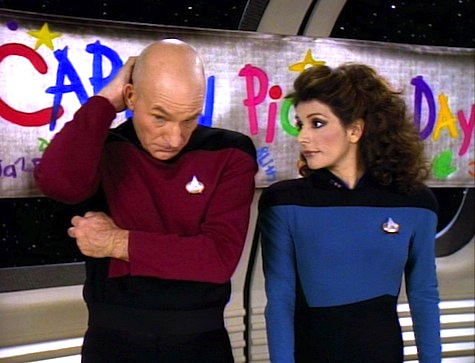
There is No Honor in Being Pummeled: When Pressman tries to take over the ship as well as the mission, he orders Worf to escort Picard off the bridge. Worf hesitates for maybe half a second before he folds his arms and doesn’t move. The message is clear—if you don’t got Worf on your side, you don’t got nobody on your side.
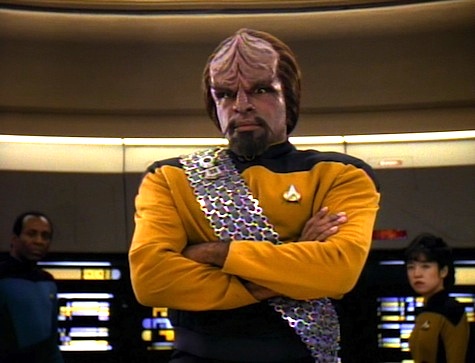
In the Driver’s seat: Ensign Gates finally gets a line of dialogue while the camera’s on her, saying, “Course plotted, sir,” as the Enterprise prepares to enter the asteroid.
I Believe I Said That: “So who won the contest?”
“Oh, uh, Paul Menegay—a seven-year-old. He did a most interesting clay sculpture of my head.”
“Was that the orange one with the lumpy skin?”
“Yes.”
“Mhm.”
“Oh, you’ll be interested to know that I’ve arranged for a Commander Riker Day next month. I’m even considering making an entry myself.”
“Great.”
Riker and Picard discussing Captain Picard Day, and then the captain hoisting the commander on his own Picard. (Cue groans.)
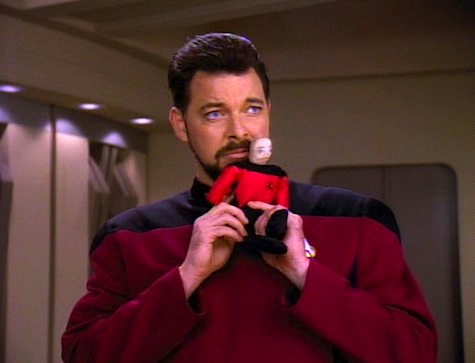
Welcome Aboard: Terry O’Quinn has become one of the most well-regarded television actors working today, probably best known for his role as John Locke on Lost. He’s here as Admiral Pressman, with more hair than we’ve come to expect him to have, though still not a lot. Rounding out the cast are Nancy Vawter as Admiral Blackwell and the delightfully smarmy Michael Mack as Commander Sirol (who has the distinction of being the first African-American actor to play a Romulan).
Trivial Matters: This episode finally explains why the Federation has never used a cloaking device, which has been an open question pretty much since the notion of cloaking technology was first raised way back in “Balance of Terror” on the original series: it was part of the terms of the Treaty of Algeron (the treaty itself established in “The Defector”). The research the Pegasus is established as having done twelve years earlier is similar to that done by the Romulans in “The Next Phase.”
Blackwell tells Picard that warp-speed limitations are suspended for the duration of the mission, proving that they are remembering the events of “Force of Nature” while simultaneously ignoring them where at all possible.
The framing sequence of the Enterprise series finale “These are the Voyages…” took place during this episode, as Riker re-created critical events on Captain Jonathan Archer’s Earth ship Enterprise by way of aiding him in his decision to tell Picard about the cloak—though the events of that episode really only fit into this one with a really big hammer. Leaving aside the fact that Jonathan Frakes and Marina Sirtis are noticeably ten years older in the Enterprise finale, there’s really nowhere in this episode for Riker’s holodeck jaunts to take place, nor does his decision at the end to tell Picard jibe with this episode in which he doesn’t tell Picard until he’s more or less backed into a corner.
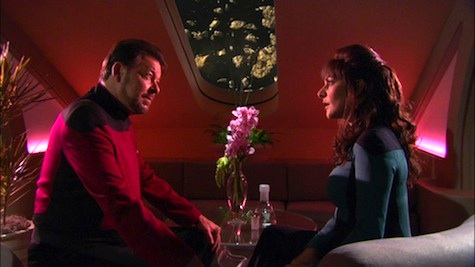
The short story “Loose Ends” by Dayton Ward in New Frontier: No Limits has Mackenzie Calhoun working for Starfleet Intelligence and going undercover to destroy the phased cloak; Sirol appears in that story as well. The Lost Era novel Deny Thy Father by Jeff Mariotte shows Riker’s earliest days serving on the Pegasus under Captain Pressman after graduating from the Academy.
Originally, the script called for the teaser to show Data, Troi, and Riker rehearsing Pygmalion, but Michael Piller scotched the idea, so Ronald D. Moore wrote a sequence that would take advantage of Jonathan Frakes’s excellent impersonation of Sir Patrick Stewart.
Make it So: “You’d rather be a traitor than a hero.” The all-around WTFery that was the Enterprise finale—about which plenty has been said (here’s a particularly cogent piece from Jamahl “Jammer” Epsicokhan)—has made it easy to forget that “The Pegasus” was a damn fine hour of television.
One of the first things we learned about William Riker in “Encounter at Farpoint” was that he refused to let Captain DeSoto of the Hood, under whom he served as first officer, beam down to a planet during a crisis because it was too risky. Picard himself reminds us of this when talking to Pressman, which is handy, because we learn how Riker got to the point where he would do that in this episode. As an ensign, fresh out of the Academy, he blindly obeyed his captain and most of his crewmates died. While that action probably helped his career—Riker has been established all along as having a fast promotion track, viz. “The Arsenal of Freedom,” which established that he was offered a command of his own before signing onto the Enterprise, not to mention “Second Chances”—it also made him realize that blind obedience wasn’t always the right thing.
But dumbass things we do when young can sometimes come back to haunt us, and Riker gets a huge lesson in that. It’s interesting, even though I watched TNG enthusiastically when it was on the air two decades ago, and have seen individual episodes plenty of times, this rewatch has given me a new appreciation of some aspects of the show. Some are negative—I intensely dislike the Geordi La Forge character a lot more now, for example—but as we near the end of this rewatch, I’m really coming to appreciate the growth of Jonathan Frakes as an actor. I doubt that the John Wayne-channeling first season Frakes could have pulled this episode off, but he nails it here. His anguish is palpable, as is his guilt, and while I won’t call it subtle (his snotty use of “Yes sir” to snark off Pressman whenever the admiral shoots him down is pretty obvious, for starters), it’s effective.
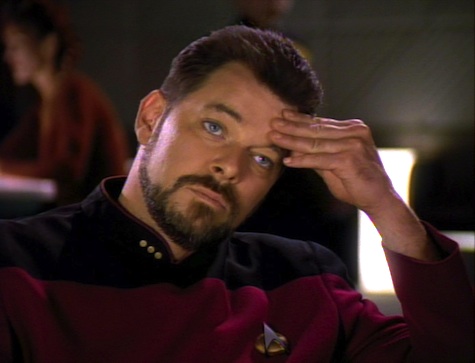
The episode is so beautifully constructed. By opening with the Captain Picard Day silliness, we get to see just how close Picard and Riker have become: Riker’s impersonation of Picard and teasing him about the orange lumpy bust, Picard coming back at him with the threat of “Commander Riker Day.” It’s wonderful stuff, which then gets turned on his ear when Picard throws the JAG report in Riker’s face. Sir Patrick Stewart’s slow burn in this episode is magnificent, as he knows that Pressman and Riker are hiding stuff from him, and he wastes no time in trying to get to the bottom of it. And his disappointed anger at Riker is as devastating as the like feelings he had toward Wes in “The First Duty”—another Ron Moore script about duty and the covering up of lies. Even though you know that Frakes has second billing and isn’t going anywhere, you still feel like Picard absolutely means it when he says he may need to reconsider the command structure of the ship.
In addition, Moore does right what was done wrong in “The Chase” and “Force of Nature.” We finally get an explanation for why the Federation doesn’t have cloaking devices (beyond Gene Roddenberry’s oft-stated dictum that “we don’t sneak around”), and it’s one that works. But it’s not what the episode is about, really. Hell, we don’t even find out what “the experiment” is until the final act (though the prop designers gave a bit of it away by having the device Pressman liberates from the Pegasus engine room look a lot like the cloaking device from “The Enterprise Incident”), because that’s not the story. The story is Riker’s dilemma and how he must balance what he did as a callow youth (obeying the letter of duty while violating its spirit) with what he needs to do now (vice versa).
The one place where the script falls down is in Admiral Pressman, who is the stereotypical Evil Admiral that has become a Trek cliché, but here Moore is rescued by Terry O’Quinn, who makes Pressman’s obsessive asshole a real person. Add to that all the little touches—the tense scenes of the Enterprise flying around inside an asteroid, the magnificent verbal fencing between Picard and Sirol (O’Quinn’s presence makes it easy to forget that he’s not the only strong guest star here, as Michael Mack is superbly oily), Captain Picard Day, Worf disregarding Pressman’s power grab—wrapped around a wonderful building mystery of what has Riker so spooked, and you get one of TNG’s best.
Warp factor rating: 10
Keith R.A. DeCandido will be at Farpoint 2013 in Timonium, Maryland this weekend, along with actors John Billingsley, Lee Arenberg, Felicia Day, Giancarlo Esposito, Bonita Friedericy, and Rob Paulsen, as well as fellow Trek scribes David Mack, Robert Greenberger, Michael Jan Friedman, Aaron Rosenberg, Glenn Hauman, Allyn Gibson, and Howard Weinstein. His schedule is here.










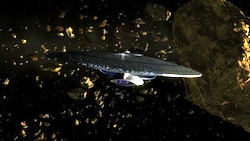
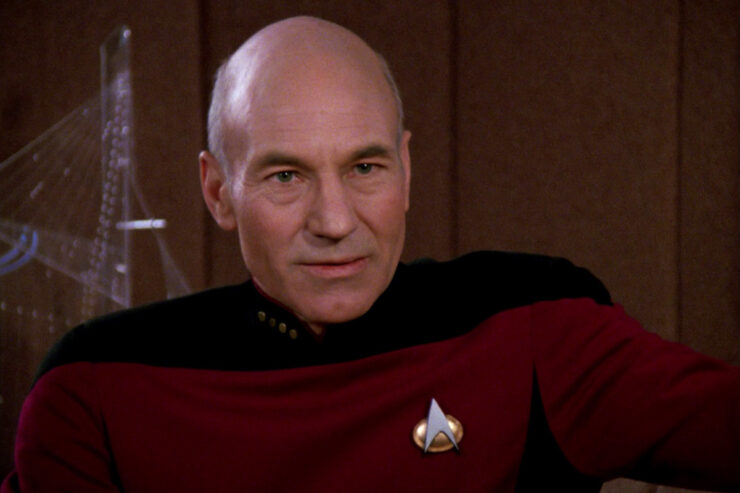

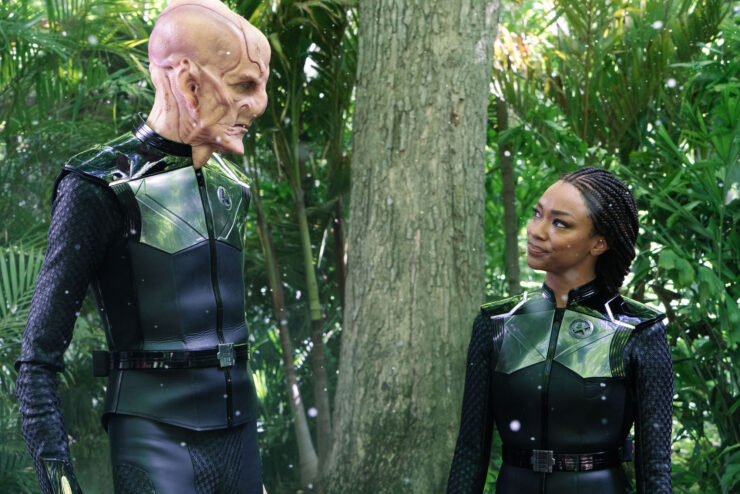
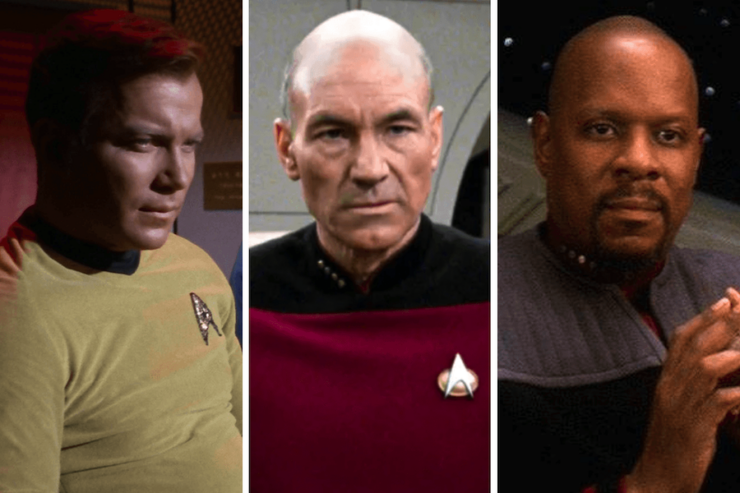
I’ve been waiting for years for Terry O’Quinn to play Robert Heinlein in something.
Alas, at this point he may be getting too old.
I remember being a little put-off by the interaction between Riker & Pressman in Ten-Forward, but only because, IIRC, it seemed a little sudden and almost like shoehorning some exposition in; considering that they only had a TV-hour to get it all in there, yeah, there wasn’t a lot of time to get any build-up or anything to it, and, yeah, it’s been a while since I actually watched it.
I thought it was great how Picard immediately dropped out of cloak, definitely showing off his character and the “Lawful Good” aspect of his personality, obeying the spirit of his duty and responsibility to Starfleet and the Federation, not just cosigning the power grab and letting it ride.
The only thing that has always bothered me about this episode is a bit of dialogue. Namely, the fact that both Picard and Riker, in two very different scenes with Pressman, refer to a “treaty that the Federation signed in good faith” – both said with the very same words. Since Riker wasn’t present when Picard said it, and vice versa, that always bothered me a bit.
But that’s nitpicking.
This is one of my favorite episodes because Terry O’Quinn and Michael Mack they make interesting villians. Another layer of cliche is added when you consider O’Quinn’s character in JAG was an admiral too just not the evil kind. I also enjoy Captain Picard Day it’s funny because kids still freak out Picard just not as much as when he firsted started on the Enterprise.
I have two comments:
1. Besides the message about honor and duty, I think there is another interesting emotional dynamic at work here: Riker’s “daddy issues.” It’s clear that Picard is a surrogate father of sorts, but that’s also a role Pressman fulfilled in the past as well. Now he has to choose between which father figure to disappoint, and either choice comes with the added bonus of significant career repercussions.
2. I remember being jolted when Picard upbraided Riker over withholding the truth. It really reinforced the idea that the one thing you absolutely did not do with the captain was lie to him or withhold information that would put the ship and crew in jeopardy. You really get the feeling Riker would rather face down several Romulan warbirds than confront a pissed-off Picard.
I know I would.
I join in with everyone that this was a very good question… the only thing that drives me a bit bonkers was this… why are we testing illegal and incredibly sensitive technology near the border of our potential enemy? The US Air Force tests technology at places like Edwards Air Force Base and Tonopah Test Range, both in the desert in the southwest continental US. The Navy tests equipment near the coast or in protected waters like the Chesapeake River basin. The Army tests equipment at places like the Aberdeen proving ground. All of these are nowhere near potential adversaries like the former Soviet Union, China, or the Middle East. Starfleet apparently tests its highly illegal and top secret equipment on the freakin’ Romulan Border. Was Remus too busy that week? Could you have made it any easier for the Romulans to infiltrate the test site and be nearby if something goes wrong???
Other than that, I am once again left wondering what is in the water at Starfleet Headquarters that the entire admirality is bat-guano crazy. I’m also amazed that Voyager went that many seasons on TV without a wacky admiral showing up every few weeks to be straddling the border of crazy and evil…
Yeah, evil Admiral plots (though this is the best of them) automatically knock down a full point but then I’d give it an 8. Great episode which has many working aspects for me but probably because of the Starfleet angle just rubbed me slightly wrong during the whole bit. Excellent job as always Keith and looking forward to DS9 especially as I’m finally nearly caught up with all my tor.com backlog :)
@6 Invoking Voyager when thinking about crazy admirals does go a fair way in explaining why Janeway is an admiral in Nemesis.
As for the episode, I liked it well enough, but I always thought Riker’s dilemma was overplayed and contrived, largely to bring that Picard vs. Riker scene into being. It seemed to me that by now, with all they have gone through, and with Riker clearly annoyed with Pressman from the get-go, he would have disobeyed Pressman’s browbeating orders before the fifth act.
It’s not a thought that ruins the episode for me, not at all, it just stuck out as being a bit too forced.
Fantastic episode, I agree that it deserves a 10. But . . .
As Lawrence Krauss pointed out in the Physics of Star Trek, a fully shielded ship would be pretty hard to see anyway, based on the stated methodology. While finally getting an in-universe reason for the no-cloaking policy of Starfleet, this smacks of the same trite explanation there are so many humanoids from “The Chase.” The real reason is of course Roddenberry’s impractical dictum, which reminds me of CLB’s issue with arbitrary story outcomes simply because the author wanted it that way. (See the comments from “Parallels.”)
For a seafaring analogy, imagine that the Romulans (and Klingons) only had submarines (some bigger than aircraft carriers), but the Federation had agreed (in a treaty!) to use only surface vessels. It’s a ridiculous notion.
I loved this episode. I never thought Pressmen was an ‘evil’ admiral because he was Starfleet Inteligence and well, that’s kind of their thing. I think that he would have worked better if we’d seen him a few more times. But I do think that his view on the Federation cloak was a lot more reasonable than Picards.
The issue of Riker holding back secrets rings true to me, as well as his delema. There are plenty of times in life where you want to do one thing but your duty or sense of loyality conflicts with it. All of us have experienced it. At work, we have confidentiality agreements. Picard may have been displeased with Riker withholding but Riker is under direct orders, so that’s understandable.
This plot summary kept reminding me of Battlestar Galactica. Then, I looked at the writing credit. Oh.
Intertextual humor: In an early episode of Lost, Boone tells Locke about the concept of the “redshirt.” Locke professes unfamiliarity with Star Trek, but comments that a captain who keeps losing crew on away missions “sounds like a piss-poor captain.” Given Pressman’s track record from this episode, well… And since Damon Lindelof is a huge TNG fan, I doubt that connection wasn’t in the back of someone’s mind.
O’Quinn also played a power-hungry military leader in the all-too-short Harsh Realm. He’s weirdly good at that.
Didn’t one novel or other establish, or at least heavily imply, that Pressman and the phased-cloak experiments were involved with Section 31?
Usually, when a comic relief scene is my favorite part of a Trek episode, it means the episode was really bad. Not this time.
I liked the callback to Riker’s backstory from “Farpoint.” It’s an interesting bit of characterization that was long overdue for a revisit.
@8: No matter how much Riker wanted to tell Picard, disobeying orders is a very serious matter. It’s not something he would’ve done until he was forced into it.
@9: Actually Starfleet’s choice not to use cloaking devices makes perfect practical sense to me. What we know about cloaks, going back to “Balance of Terror,” is that they use a lot of power, and yet ships using them need to minimize their power consumption to avoid giving off detectable signals. So you’ve got a built-in issue of diminishing returns — the more power your ship uses, the harder it is to cloak. Thus, logically, the only ships it’s really practical to cloak are the bare-bones, stripped-down ones, vessels without any power-guzzling luxuries like science labs and holodecks and bars and arboretums and big, comfy staterooms. In short, warships. A cloak was practical on the Defiant on DS9 because it was just such a stripped-down combat vessel with no luxuries. But until the Borg and the Dominion came along, Starfleet just didn’t make ships like that. Its ships were comfortable multifunction vessels designed for scientific research and diplomacy as their primary missions. Cloaks just wouldn’t have been practical on that kind of ship. So it makes sense that the Federation would’ve agreed not to develop cloaking devices.
What is implausible to me, though, is that the Federation wouldn’t have demanded that the Romulans agree to the same ban. It does seem rather asymmetrical.
And I have to disagree with Dr. Krauss. Making a ship invisible in space is actually very implausible. After all, everything radiates heat. Sure, with Sufficiently Advanced Technology you could maybe encase the ship in a spacetime pocket that would prevent the waste heat from radiating out, but then it’d just build up inside your ship until it cooked the crew. You’d have to be able to create a wormhole or space warp or pocket universe that you could dump the heat into so it wouldn’t leak out. And if you can do that, why do you need a cloak in the first place? Just make a wormhole and jump right through the enemy’s defenses.
Favorite thing about this episode? It’s funny as hell, back to front, without ever seeming “light”.
Knowing that the Romulans would probably continue to develop cloaking devices anyway, having them give them up in the treaty would be meaningless. So it might make sense to “let them” keep their cloaking devices in return for some other, more verifiable concession. In any case, I view cloaking devices as an arms race in which one side tries to make better cloaking devices and the other side tries to penetrate them. After all, it’s clear that the TNG-era Federation can detect TOS-era cloaking devices (“The Emissary”, and also the fact that no one is scared of cloaked ships that can fire while cloaked, so probably that cloaking device can now be penetrated). I just assumed the Federation was engaged in one side of that race and didn’t want to put the effort into playing the other side as well.
The UFP seem to have been pretty bad negotiators. Not only do they
concede cloaking devices to the Romulans, they also negotiate a “neutral
zone” where if Starfleet enters it’s an act of war, but the Romulans can
cavort around whenever they want. I hope they got *something* in return…
@17: In theory, the Neutral Zone is forbidden to both sides. It’s just that some scriptwriters forget the difference between the NZ and Romulan space itself. You’d think the word “Neutral” would clue them in.
I’ve been reading “Star Trek: The Next Generation 365” and found it interesting that one thing Moore wanted out of this episode was Riker in the brig for a longer period of time (as in months). He was overruled. The lack of real consequences for a main cast character’s actions, again, is the only point I would have deducted from this episode. The rest of it works, really well.
@9: The thing is your analogy would fit better the reality of the show by having the submarines surface to engage the surface warships. Since firing when cloaking is a rarely occuring possibility, cloaked vessels need to decloak before combat. This means the cloak advantage is minimized other than positioning before combat. So the treaty isn’t as nonsensical as it would seem on the surface.
@6, @7: I find it easier to digest the whole “Bad Admiral” plots by the sheer token of Machiavelli’s quote of power corrupting. If you want to take a less dim view of it, take a look at some of the shit that Kirk pulled while he was an Admiral: some of the stuff that the TNG Admirals do pales in comparison. I mean, what’s worse: ordering a crew member to turn over a newly created piece of technology regardless of it’s familial ties (ala “The Offspring”)? Or taking a skeleton crew of partially trained cadets into a blood fued with a vengeful superhuman Augment, getting the ship’s captain killed, and then stealing the same ship to enter a forbidden sector, then destroying that ship along with a group of foreign nationals who may or may not have been terrorists (Star Trek II & III)? Comparatively, regardless of how much we know Kirk was a hero, Kirk on paper seems downright diabolical.
Sure he avoids all of the charges leveled at him by saving Earth from destruction, but even at that, they kick him out of the admirality because of the fact they figure he can do less damage to Starfleet’s reputation by getting him out from behind the desk and back onto a ship so he’s less accountable for his actions out on the frontier.
So maybe all the “evil Admirals” are officers who still yearn to be captains, and never quite got to the “saving the Federation” part of their plans, thus coming off as bad guys?
@19: Ah, so I see he wanted to start his BSG career early, eh? How long was Boomer stuck in that cell after she shot Adama? Sounds eerily similar to me…
Don’t forget that when we first saw Kirk he also removed the rightful commander of a starship and demoted him for no compellingly good reason, and then almost got the ship blown up. Kirk’s treatment of Decker in The Motion Picture was, to be blunt, appalling.
—Keith R.A. DeCandido
JYHASH, stealing the Enterprise out of spacedock and taking it to the Mutara sector is the only thing in that list that counts as a legitimate charge. In STII, Kirk took command of Enterprise only after consulting with Starfleet Command and had no way to know he was going to be facing Khan. By the time he did Enterprise had been badly damaged in a suprise attack and Kirk was desperately scrambling to find a way to keep a bad situation from getting worse.
As to “may or may not have been terrorists”, the Klingons at the Genesis planet were known to have destroyed the USS Grissom, were known to have hostages, were known to have executed one of them, were known to be seeking highly classified and highly dangerous Federation technology, and were gaining possesion of a Federation vessel that, while hardly cutting edge, was still a capital ship. Quibble over the word “terrorist” all you like, but keeping Enterprise out of their hands by any means neccessary was clearly the right call. Even on paper.
I don’t know that I would give this episode a 10 out of 10 rating, but I do agree that it is an excellent hour of Star Trek. And I had completely forgotten that O’Quinn played the standard antagonist admiral in this one.
— Michael A. Burstein
Also don’t forget that, in his first encounter with the Reliant, Kirk ignored standard protocols to take a defensive posture against a ship that might be compromised. Surprise surpise, the Reliant was compromised, and Kirk paid dearly for his disregard of procedure. (Personally, but not professionally. Any competent military would have ensured that Kirk never sit in the captain’s chair again after a stunt like that.)
As far as cloaks go, DSCHWARTZ analogy @20 is pretty accurate. Also, I’m guessing there is some lag between cloaking and decloaking, because we don’t see ships do it once battle has started- they tend to stay uncloaked and thus open to return fire. That’s what made Chang’s prototype bird of prey that could fire while cloak so devastating. But in reality, as DSchwartz said, the submarine (in this case the romulan ship) has to make itself visible to fight, which means it becomes much more fair. The advantagees of a cloak would be that the ship can lurk around and spy, make easier escapes, and get into an attack position.
In fact, Kirk and Sulu missed a very simple countermeasure to Chang’s bird of prey firing when cloaked… shoot back at t he point of origin of the torpedo. Standard submarine tactics include firing a torpedo at the point of origin at a launch, if for no other reason than to make the other guy dodge it. But Kirk/Spock’s tactic of firing essentially a heat seeking torpedo would be equally effective, and ultimately wipe out the advantages of the cloak. So long as the torpedo was out there searching, you couldn’t move, and since you couldn’t move, if you fired, anybody could shoot a torpedo back at you which you couldn’t dodge.
Though back at Chris… the idea behind the Pegasus’ cloak was that it put the ship out of phase with the rest of reality, so it’s possible that any heat/energy/etc would also be out of phase with the rest of the universe, making the ship invisible. In fact in the Typhon Pact series of novels the Romulan cloak does exactly that. But prior to Pegasus, cloaks probably just worked similar to modern stealth technology… make it very very hard (but not impossible) to see the thing behind the cloak.
@26: Firing back at the point of origin wouldn’t work in a space battle, since nothing stands still in space. Everything’s in some sort of orbit or powered trajectory. Whatever point the ship was at when it fired the torpedo is not where it’s going to be even a second later, let alone after however long it takes for an exchange of fire in both directions.
True, ST often portrays ships essentially keeping station relative to one another when engaging in battle, but any competent commander of a cloaked ship would know better than to stay in one place. Chang would’ve had his ship on the move throughout the battle.
I love the fact that Federation technology that’s outdated by a decade is still the most advanced cloaking devices around. Me and friend always used to joke about what a terrible invention a car with a cloaking device would be. Well not so with the federation device! What’s the practicality of a phase shifting cloaking device? Space is huge! How often do you need to fly through a planet?
I may rewatch this one again. I remember thinking, “Oh look, there’s another admiral. He’ll be terribly immoral, though possibly not amoral, so we’ll spend the show finding out how he’s misbehaving and then speechifying about it. AGAIN.” I was pleasantly surprised to be wrong about the speeches, and I liked Captain Picard Day, but this one was emotionally an overall “Meh” for me. The show had simply used up all my goodwill for admiral plots.
@28: How useful it would be depends on exactly how it works and whether it can be stabilized any; the obvious immediate advantage is that nobody can shoot you when you’ve got a phased cloak on, even if they can detect you. That’s largely a defensive advantage, but nothing wrong with that. And if you can possibly adapt it to weapons use, you have just acquired a ridiculous advantage over pretty much everybody. (Until your ship blows up. I’m guessing we never saw a phased cloak after this because nobody was able to get around the ship-blowing-up issue).
Also, I adore this episode. Captain Picard Day is ridiculously charming (I’m just sorry we didn’t get to see Picard’s reaction the first time it was explained to him that the small children of the Enterprise were going to be having a holiday in his honor). Admiral Pressman has so much force of personality and chemistry with Riker that he redeems what is admittedly an overused role. (And it also doesn’t hurt that “the Federation agreed not to use cloaking technology” does sound pretty dumb at first hearing, though there’ve been intelligent arguments made for it here.) Picard confronting Riker in the ready room scene is wrenching, and yeah, you totally believe him when he says–in a dead-level tone, no raised voices now–that he may need to get a new first officer. (Well, okay, you don’t believe it’s going to happen, not halfway through the show’s final season, but you believe that Picard means it.) And I loved the callback to the conversation in the pilot.
But mostly, I love this episode for being such an awesome showcase for Jonathan Frakes. When I think about this episode, the first thing I always remember is the self-directed viciousness in Riker’s voice as he explains the mutiny to Picard. (“My head still ringing with words like ‘duty’ and ‘honor’…”) I agree with Krad; I don’t think first-season Frakes could have done this (and it wouldn’t have had half the impact coming from first-season Riker). Just a really good performance.
@6 “Starfleet apparently tests its highly illegal and top secret equipment on the freakin’ Romulan Border.”
This reminded me of the Voyager episode “Message in a Bottle” when another experimental federation ship is lost and actually captured by the Romulans.
@30 – That’s a good point! I never thought of it from a defensive perspective.
Although as we know from the Season 5 episode “The Next Phase”, out of phase incoming fire would pass through shields, then walls, but not floors. So they’d have to sort out that minor detail.
@28: “What’s the practicality of a phase shifting cloaking device?”
There’s a rather ingenious answer to this in the 2012 duology Typhon Pact: Plagues of Night/Raise the Dawn by David R. George.
*looks up books* Ah. Yeah, I suspect that the subterfuge aspects of the thing were also not lost on Starfleet, given that the head of Starfleet Intelligence is one of the people interested in it.
@23: Sure, most of the charges were dropped, but due to what the Federation President said were “mitigating circumstances”. They were still more or less guilty of breaking Federation Law. The charges leveled against Kirk in STIV were:
– Conspiracy
– Assault on a Federation Officer
– Theft of Federation property
– Sabotage of the USS Excelsior (more leveled at Scotty, but ordered by Kirk, and since so egregious, probably not rolled into the ‘Conspiracy’ charge)
– Willful Destruction of Federation Property
– Disobeying Direct orders from The Starfleet Commander
(I’d also add “Unauthorized Use of Federation Property” because of the unauthorized Transport to the Enterprise in spacedock during ST III; The Transporter Officer complained of no travel orders or encoded ID’s, so that was probably illegal as well)
Kirk is a bit monstrous on paper, methinks, regardless of some of the other stuff, and that’s just from one movie.
For STII, you’re also right, Kirk says that he tried to fight Starfleet Command on going off to investigate Regula I’s problem, so it wasn’t him being willful. But I agree with @25 in that he did not take proper procedures for a ship that was acting erratically until far too late, which is something that he probably should have been court martialed for. Not as big as Picard’s slip up with the Stargazer at the Battle of Maxia (i.e. losing his ship), but enough to question his command ability.
Concerning the Klingons, you’re right, Klingon Ambassador Kamarag did admit to the charges of them being rogue agents in front of the Federation Council when confronted by Ambassador Sarek, so that probably fall under fair doctrine of self defense.
And KRAD, I agree that Kirk was completely out of line concerning the V’Ger incident, and even better is when he’s constantly being shown up by Decker. Though, he was able to convince Admiral Nogura to give him command for the mission, so technically it was all under orders.
Then again, Pressman may have been under orders from SI and the Admiralty as well. Sure, he was arrested by Picard for the duration of his stay on the Enterprise, but who’s to know if he ended up actually doing time with Admiral Leyton, or if once he got back to Earth he was censured or got a slap on the wrist, and went back to being an evil Admiral…
And here’s a fun little detour showing (humorously) all the laws Kirk has broken.
Just goes to show that getting the Admirality promotion can make anyone go off their rocker…
I thought it was a bit hypocritical that they castigate Pressman et al for developing the thing, but at the first sign of trouble they install it and use it rather than facing the harder road.
@36: But they didn’t use the phase cloak the way Pressman intended. Picard didn’t use it to conduct military or espionage missions; he used it because it was the only way to escape being trapped inside the asteroid, and then he immediately exposed its existence to the Romulans, thereby completely scuttling Pressman’s hopes and intentions for it. So no, it’s not hypocritical at all.
I can only reconcile to myself the Federation surrendering cloaking tech as a way to get some other concession from the Romulans (and maybe others). The Romulans likely see cloaks as an equalizer against the larger Federation combat ability (because, if the Romulans could win in a war with the Federation, they likely would start one).
I also misremembered Kurtwood Smith as Admiral Pressman.
@38, Kurtwood Smith as Admiral Boddicker would be awesome.
@6, They also like to experiment with combustible new technology right down the hall from the warp core.
Edited to add: On a related note, one my college friends loved to point out that the #1 cause of fatality on a starship is the exploding console. You’d think they’d solve that with low-power consoles at some point.
@39… Good call on the safer consoles. Maybe just a console that doesn’t become high speed shrapnel. For us submarines, the ashtrays are specially designed to break apart into three pieces with dull edges. Starfleet apparently designs their consoles to drive a piece of console directly into either the jugular or the temple of the crewman in front of it.
adamjmil: “down the hall”? It’s usually in the same room as the warp core. *chuckle*
—Keith R.A. DeCandido
@40: And yet they still have ashtrays, which implies there’s smoking on submarines. How is this safe exactly? ;)
@39, Electricity was so 500 years ago. Consoles are powered by antimatter directly piped-in from the warp core. Of course.
JYHASH, in STII Kirk did order Yellow Alert as Reliant approached. Not immediately on Saavik’s interjection, but he did do so. It would not have been reasonable or within the scope of Starfleet regulations to go to Red Alert, thus raising shields and arming weapons, without knowing more than they actually did.
I submit that “willful destruction of Federation property” was a charge that was raised as a bit of legal and political theater; after all, the destruction of Enterprise was unavoidably neccessary at that point (granted, it reached that point due to the aforementioned conspiracy and theft) to keep it and all information that could have been gleaned from it away from a foreign power that was known to be hostile to the Federation.
@41, I was trying to be generous :).
I really like this episode, but I just can’t get over how ridiculous Picard’s actions are at the end.
To quote from Phil Ferrand’s book: “In essence, Picard converted an internal Federation crisis into a foreign policy crisis and handed the Romulans a diplomatic coup”.
By all rights, after exposing the cloaking abilities to the Romulans, Picard should have been court martialed and thrown out of Starfleet.
(regardless of any formal investigation into the actions of Pressman and other admirals)
I’m glad you mentioned the Enterprise episode and that he really doesn’t have time in this episode to be doing all that. I felt that episode undermined this one a little bit, in addition to farting all over the NX-01 crew for their final episode. I just don’t think the emotion (or lack thereof) in that episode jived with what was going on and Riker’s state in this one. That episode was acted like it was a reunion skit for the TNG cast at a convention or something, and I felt like they weren’t throwing their weight into it or recapturing Riker’s stress from this episode. Not to mention, as was said, that the fact that he made a decision to tell Picard prior to being backed into a corner doesn’t mesh… and Troi also knew about the whole thing now and didn’t say anything??? Again, I also thought her reaction to it was very underwhelming.
Did anyone else think there was a lot of sexual tension between Pressman and Riker? There’s gotta be some great slash-fic based on this episode.
This may be the most interesting set of TNG Rewatch comments I’ve seen on any episode. Thought-provoking, and I appreciate everyone taking the time to weigh in. I’d give it a solid 8 – taking points off for the hackneyed “Evil Admiral” plot device that so many have commented on, even thought O’Quinn is very good in the role. As for the Kirk comments, I do not pretend to be as fluent as most here in the nuances of Star Trek history and backstory. But for me, Kirk symbolizes the triumph of humanity despite our glaring flaws. As a species, we can be proud, arrogant, impulsive, illogical, jealous, and insubordinate – but each of these characteristics can be turned into a strength (or virtue, if you will) at the right moment, which in the history of Star Trek, seems to be something for which only humans have an intuition. Kirk embodies the flawed hero, and although Picard is more of an ideal, Kirk will always be the most compelling figure in the Star Trek universe.
Picard’s analysis lacks moral nuance. Because it is in the treaty, it is immoral to develop a cloak. What is lawful is moral. You’re better than that, Picard. The clear moral issues here were with concealment of the risks to the crews, all else is up for debate. I appreciate that his own stance is to act lawfully, but a keen mind would acknowledge the Admiral’s actions should be analyzed under a different rubric.
A contract signed under duress or threat is invalid. A peace treaty negotiated under threat of war is not a contract, but it bears scrutiny when terms are agreed to under such conditions. It is plausible the Federation agreed to this unequal and arguably unfair term as a means to placate an agressive and unreasonable foe. Had the Romulans given an equal concession, it would be a fair and lawful provision. But without knowing this, we cannot assume it is automatically unethical to covertly violate this provision.
I could assume Picard knows the terms of the treaty to be fair, but I find this unlikely from what I know of the Romulans. So I found his assumption that what was lawful was right to be unsophisticated.
It’s not the only time he does this, though he does on occasion question this principle. As a whole, it’s very uneven.
And I say this as someone who unfailingly tests “Lawful Good,” but just abhors over-simplification. :)
@50 I would never argue that Picard lacked moral nuance, certainly not in the aggregate and not in this instance either. Picard is plenty good at violating federation law when he feels it is necessary (e.g. The Drumhead, Who Watches the Watchers, and Pen Pals all come to mind).
With respect to the legal niceties surrounding a treaty: I certainly don’t think nations, space powers, or whatever can disregard them due to a disparity of bargaining power or negotiation of the threat of force. Think of the series of treaties that ended WWII… We wouldn’t allow the defeated powers to renounce those in moral grounds, just because they were defeated powers. It’s not akin to the concept of a contract of adhesion (i.e. Legally voidable due to one side having more power offering “take it or leave” it terms). Further, as a total aside, except for certain provisions such as liability waivers or arbitration clauses, I haven’t actually seen the contract of adhesion argument succeed in voiding a whole contract anywhere outside of law school (which has been a while for me). It was a concept that worked in the Nineteenth Century, but modern commerce would essentially fall apart if take it or leave it agreements were unenforceable as a general rule.
We have no real information about why the Federation entered into this treaty, but we must presume that the Romulans gave up something equally important, such as a bunch of occupied star systems, ending research of phasers… Who knows?
Also, revealing the violation to the Romulans makes sense to me as Pressman could call in a few favors by his friends at Starfleet Intelligence, and cover up the whole thing AGAIN.
6: We never saw many admirals in Voyager because they were lost in the Delta Quadrant, far from Starfleet Headquarters.
28: We did see a cloaked car in Die Another Day, and look at how well that went with the fans.
The Pegasus is worth the price of admission alone for the look on Riker’s face when Picard implies that the Enterprise will need a new first officer if Pressman takes the crew into unnecessary risk.
Wouldn’t this episode imply that Thomas Riker also knows about the illegal cloaking device from the incident 12 years prior? (Thomas was created 8-9 years Prior while on duty after the Pegasus incidents.)
Amyzzon: Yup.
—Keith R.A. DeCandido
The episode is excellent all the way through, except for the very end when Picard makes the most stupid decision he could. Instead of escaping the sector leaving Romulans in complete darkness he just went and betrayed entire humanity. What’s worse, consequences of his action were just omitted !!! I would think that Romulans would want to take such a piece of equipment with them and would not even hesitate to start a war over it. Not only did that device cloak Enterprise but it also allowed them to go through a solid matter without any side effects on the crew or the ship. How could a Star Fleet officer reveal something like this is beyond me (especially when we take into account some of his previous actions).
What’s also stupid is that there were no more attempts to make another version of such device in 12 years (that we know of). Surely there were specifications of that device so in the first place they should have destroyed the asteroid and be done with it. As for the treaty, it’s insanely stupid and I don’t get why would someone agree to it. But even after agreeing, having and using a cloaking device could not be detected unless someone would be as stupid as Picard.
Very, very disappointing end of a great episode, one which makes you wonder how come neither Romulans or Klingons haven’t conquered The Earth yet.
@55. Leaving the moral issues of breaking a treaty aside, the cat was out of the bag the moment the Enterprise used the phasing cloak to escape the asteroid. Once Sirol realized Picard wasn’t giving him an answer, he’d have scanned the asteroid and discovered the Enterprise missing. That’s Big Fat Clue #1.
Then Sirol would have found the Pegasus wreckage, and sent away teams, finding the engineering section, and whatever records and equipment survived the initial explosion and 12 years of neglect. Big Fat Clue #2.
Between the two, the Romulans would have been able to add it all up and realize that the Federation violated the treaty and developed a working phase cloak. But the Romulan response would not likely be an angry ambassador sputtering in Moral Outrage. It would be covert missions deep into Federation territory to determine just how far the Federation’s research has progressed, sabotage of said research, and finally an invasion of the Federation and the start of the next Romulan-Federation war.
Both the Romulans and the Federation are “great powers” and one definition of a “great power” I’ve heard is a nation strong enough that it can make the consequences of invasion by another great power too terrible to contemplate. It’s an open question whether the Federation or the Romulans would win such a war (and the Romulans, knowing the cloak exists and is being perfected in secret, would likely start the war sooner to keep the Federation from getting too much of a head start), but it would certainly result in the victor being so weakened that another power could invade and conquer them easily. Perhaps the Cardassians. Not to mention the possibility of another Borg invasion somewhere down the line, which either the Federation or the Romulans might be able to defeat if they were at full strength. The strategic repercussions would be disastrous.
Also, there’s the fact that such a war would kill millions of people on both sides. All because a couple of captains decided to say “screw it” to a treaty.
No. Picard’s actions replaced doubt with certainty and offered both the Federation and the Romulans a chance to get out of this mess intact. Plus, as was stated upthread in #51, by exposing the cloak’s existence to the Romulans, Picard neatly prevented Pressman from covering things up again and escaping unscathed.
They got the uniforms of the corpses on the Pegasus right; they were the season 1/2 type. They were always good about costume continuity like that in this show.
The only problem I had with this episode was the Enterprise Series Finale.
Pegasus was just all around a good episode.
All this talk about the Enterprise series finale makes me wonder if the series is worth watching. I only ever saw the first few episodes, and thought it had promise. But these comments…
@59/Firefox: Enterprise is an uneven series, but it has its benefits. I feel the show, and the first season in particular, did a better job than any other Trek series of capturing the feel of exploring the unknown and making new discoveries, and of portraying alien life as genuinely alien and challenging to understand. There’s an interesting overall arc, especially in seasons 1 & 4, of humanity gradually establishing its place in the galactic community and forming relationships with other species. I also feel it’s the most mature and thoughtful Trek series in its approach to crew fatalities — rather than just casually killing off redshirts and having the crew laughing and joking by the end of the episode, it held off on depicting crew deaths until it could do so in a way that mattered and could show the crew feeling the impact of the loss. It does terrific work fleshing out Vulcan and Andorian civilizations and history. And its production values are the best of any Trek TV series, and I’m counting Discovery in that.
It does have its share of weak writing, though, and its approach to sexuality tends to be sophomoric. The “Temporal Cold War” arc in the first three seasons is muddled and directionless, since it was imposed on the producers over their objections. And the second season is fairly weak overall; while season 1 had a subtle but pervasive arc and sense of direction to its stories, season 2 just meanders and never really comes together. Season 3 is far more serialized, with a single overarching storyline that holds together pretty well aside from some really inane science. Season 4 is great for Trek continuity buffs, with a strong sense of tying the universe together and showing how the world of ENT sets up the world of TOS, and with an innovative approach of telling stories in 2- or 3-episode arcs, but it also loses that sense of exploration and discovery and becomes much more politically driven.
As for the series finale, it’s widely hated even by those of us who liked the show overall. We generally think of the preceding 2-parter as the real finale and “These Are the Voyages…” as an ill-conceived epilogue.
I think this could have been a great motion picture instead of a chapter in the TV series adding a couple of elements: there is room to do flashbacks in The Pegasus, more Enterprise risk moments inside the asteroid, Picard’s investigation, consecuences in Riker’s carreer that regular series could not afford, (maybe a final scene with the martial court…) Just dreaming of a solid TNG film…
This is a great episode of Star Trek with a bizarre finish (Picard’s actions here rival his actions in I, Borg and Insurrection as evidence that no sane head of Starfleet Command would ever keep this guy in charge of the Federation’s most important ship). But I don’t want to rehash years-old arguments in the comments.
The biggest weakness in this episode is actually not Picard’s finale (that’s baked in the cake at this point in a series with him in command), it’s the U.S.S. Pegasus, itself.
The incredibly small, crappy Oberth-class ship (which was being sold to civilians in TNG’s century) would never be used to conduct any kind of important tactical/defense-related research. According to many notes on the episode, the writers thought it was going to be a Cheyenne-class vessel (and there is a diagram showing four warp engines in the episode, itself). But to save money, they used the Oberth. That kind of re-use of a model ruins immersion and plagued TNG almost as much as TOS (Miranda-class ships being used as freighters? Birds of Prey being viable Klingon battleships and not just small scout ships? the freighter from Star Trek III being a powerful Sheliak colony ship? etc. etc.)
As Roddenberry said in his notes for TNG season 1, the ships matter. They are characters. Guest ships are sometimes just as key as guest actors. The Pegasus being an Oberth undermines the plot and is a black mark on a largely excellent episode.
I just watched this episode again for the first time over 20 years and I agree it’s great. I agree that Terry O’Quinn was very good in this role. The one thing I disagree with is I didn’t feel Admiral Pressman was an overtly evil character. I think he was simply very negligent but not malicious. He was portrayed with enough nuance that you could see things through his eyes and understand why he made the decisions he did with enough explanation that some people might be inclined to agree with them.
Yes, his actions were careless and even reckless, but the deaths he caused were not intentional, so I don’t think he is truly an evil character.
However, he ultimately did deserve to be held legally accountable because he did violate the treaty and then covered it up.
Just recently they were drilling into a planet’s magma to reliquify its core, and now they cannot escape an asteroid without a special new cloak.
@64/GeordisWingman: As Data explained, the asteroid was dangerously unstable. Trying to cut their way out with phasers could’ve collapsed the chasm and crushed the ship. It’s a different matter when you’re actually inside the thing than when you’re firing on it from thousands of kilometers above it.
In my first time all the way through TNG* I have been reading these re-watch entries and have come to several of them with something to say, but always found that someone had beat me to it (shocking, eight-plus years on!)
So when I finally have something to add to the existing conversation, it is a response to the conversation here instead of directly to the episode:
It seems to me that those suggesting Picard’s decision to drop the cloak was unjustified, and the weakest moment in the episode, are forgetting just how apropos the repeated use of the word ‘experiment’ had been. The last time this device was used went very, very badly, and for as yet unknown reasons. No one was at all sure they were going to make it through the 3km of rock they had to traverse to escape the asteroid**. The idea that they could have trusted the cloak to see them safely over an astronomically [see what I did there] greater distance, out of sensor range of the Warbird, would be quite a leap of faith. There is certainly a Picard-as-idealist side to that decision, but there was also a deeply pragmatic reason not to trust the 1,000-odd lives on the ship to an experimental cloaking device for a moment longer than was necessary.
* I would have been exactly the right age (slightly younger than Wil Wheaton) to have watched and loved TNG as broadcast, but didn’t have a TV at the time. Instead I became a Trekkie-by-proxy through books, the movies, and the internet over the course of the nineties and beyond.
** There should have been a shot of Picard, or the whole bridge’s involuntary reaction(s) at the moment they ‘hit’ the wall of the chasm.
I know this is a 9 year old typo correction, but Riker reports to sickbay, not repots.
@67: Fixed, thanks :)
I think it’s interesting to analyze the Pegasus “treaty violation” in the context that the Romulans have been incommunicado for seventy years. It’s only in “The Neutral Zone” we find out they’ve done anything that gives the Federation reason to think they’re up to something.
@Christopher also states that the writers are confusing “Neutral Zone” with Romulan Space. I think it’s more likely the Romulans simply DO break their word regularly and violate the treaties they have formed. As we’ve seen with Russia, plenty of authoritarian dictatorships don’t actually take treaties as binding them while expecting other people to follow them to the letter.
It would actually be LESS believable if they acted with honor and restraint as I can believe in warp drive but not in the nobility of fascist powers.
What I wanted to say is exactly what Jeremy says in Comment 62 – that the use of an Oberth as the Pegasus is quite a disappointment. The Oberth is something of a joke ship to many of us who are particularly interested in the ships, following the Grissom’s unceremonious dispatch in ST III.
I would only add that it’s even more grating to consider the Mighty Riker beginning his career at the helm of this most un-threatening and fragile of vessels. Additionally, in comment 14 CLB makes interesting note of the power ratio required to run a cloak, so Pegasus – as a science and support vessel – might have been further neutered for that mission.
But despite this quibble, yes, it’s an excellent, gripping episode, with a hefty emotional punch. Definitely a 10-pointer!
@70/Jim Cole: “Additionally, in comment 14 CLB makes interesting note of the power ratio required to run a cloak, so Pegasus – as a science and support vessel – might have been further neutered for that mission.”
No, my argument is that a cloak is impractical for a ship whose mission profile involves power-hungry things like science labs, crew recreation and comfort, and so forth, which is why cloaks tend to be used more for austere military vessels without comforts or luxuries. But if a science vessel’s entire mission is to test an experimental cloak, then of course its power usage is going to be optimized for that experimentation. It isn’t on an extended, open-ended mission that requires crew comforts and holodecks and powerful sensors and all that, so there’s no need for any extraneous power usage.
In other words, I’m not saying that science vessels are physically incapable of using cloaks — they can if they just cut off all nonessential power use. I’m saying that cloaks are incompatible with the usual mission priorities of Starfleet vessels, so Starfleet doesn’t find them desirable or practical to use as a matter of course, because the required austerity measures would hamper a Starfleet vessel from the kind of things they normally need to do. It’s like, while it might be a good idea to put heavy body armor on an infantryman in combat, it would be counterproductive for an Olympian in a pentathlon.
“Riker … jabbed when he should’ve blocked”
Guard! Turn! Parry! Dodge! Spin! Ha! Thrust! *doinnngg*
I always thought it a little weird that Picard is riding Riker so hard, trying to get him to disobey orders. I get he’s worried about the ship, but up to this point there hasn’t been any real major direct danger aside from the usual Romulan snark.
If I were Riker, it’d be hard to not tweak his nose a little when Pressman ordered him to take the Enterprise into the asteroid and Picard’s only resistance was a note in the log. I’d be like what, I’m supposed to break direct orders from the admiralty to talk about an incident from twelve years ago but you won’t do the same to protect us from actual danger in the present? Thaaaaaaaanks lol
Why no Saucer Separation ?
After the Pegasus has been positively located, Pressman orders Picard to take the Enterprise inside the asteroid.
There was no discussion of separating the Saucer from the Star Drive.
A shuttlecraft was ruled out because the engines or navigation systems might not have enough power, but the Star Drive section would have probably >80% of the power of the complete Enterprise, while keeping a significant part of the crew and families in relative safety.